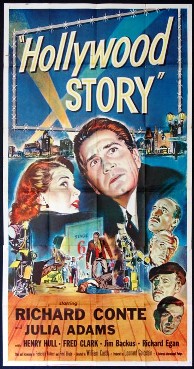Hollywood Story
| Hollywood Story | |
|---|---|
 Theatrical release poster | |
| Directed by | William Castle |
| Screenplay by | Frederick Brady Frederick Kohner |
| Story by | Frederick Brady Frederick Kohner |
| Produced by | Leonard Goldstein |
| Starring | Richard Conte Julia Adams |
| Cinematography | Carl E. Guthrie |
| Edited by | Virgil Vogel |
Production company | Universal Pictures |
| Distributed by | Universal Pictures |
Release date |
|
Running time | 77 minutes |
| Country | United States |
| Language | English |
Hollywood Story is a 1951 film noir crime film directed by William Castle starring Richard Conte and Julia Adams.[1]
The film was an attempt by Universal Pictures to take advantage of the success of Paramount's Sunset Boulevard which was released the previous year. The plot is based on the notorious murder of silent movie director William Desmond Taylor.[2] While Hollywood Story reaches a fictional conclusion, it follows the circumstances of the real-life event closely.
Upon the release of the film, Universal promoted the appearance of several once famous silent screen celebrities. It came to light that the ones with speaking parts had received just $55 per day of shooting for their roles. Others, like Elmo Lincoln, the first screen Tarzan, were used as non-speaking extras and received only $15 per day.[2]
Plot
New York theatrical producer Larry O'Brien (Conte) plans to found a motion picture company in Hollywood. He buys an old studio which was unused since the days of silent movies. There he's shown the office where a famous director was murdered twenty years earlier. Although there were many suspects the case hasn't been solved. O'Brian becomes fascinated by the subject and decides to make a film based on the case. To this end he begins interviewing the surviving participants and soon gets into danger himself. In the end it turns out that the murderer is the victim's jealous brother.
Cast
- Richard Conte as Larry O'Brien
- Julia Adams as Sally Rousseau / Amanda Rousseau
- Richard Egan as Police Lt. Bud Lennox
- Henry Hull as Vincent St. Clair
- Fred Clark as Sam Collyer
- Jim Backus as Mitch Davis
- Houseley Stevenson as John Miller
- Paul Cavanagh as Roland Paul
- Katherline Meskill as Mary
- Louis Lettieri as Jimmy Davis
- Francis X. Bushman as Himself
- Betty Blythe as Herself
- William Farnum as Himself
- Helen Gibson as Herself
Reception
Critical response
Film critic Bosley Crowther panned the film and he blamed the script. He wrote, "It is easy to see, now, why some pictures which sound promising at the start, on the strength of the ideas behind them, turn out to be dismal flops. Hollywood Story demonstrates it ... scriptwriters Frederick Kohner and Fred Brady have cooked up in the way of a plot—is a pretty routine assembly of simple who-dunnit cliches into a silly and not very startling disclosure of a motive for a crime. The police must have been awfully lazy back in 1929."[3]
Film critic Dennis Schwartz generally liked the production and wrote about what may have motivated the studio executives to produce the film. He wrote, "A fairly absorbing crime thriller whose plot involves a look at Hollywood's silent stars. The film tries to capitalize on the success of the similar themed silent film modern day venture Sunset Boulevard which was released in 1950 ... The climax makes for a hard to guess whodunit and a nice peek into the silent film era and at some silent stars who make a cameo appearance and speak a few lines, like Helen Gibson and Francis X. Bushman ... The only thing that failed to work smoothly into the twisty script by Fred Kohner and Fred Brady and the confident direction of William Castle, was the romance between Adams and Conte. They end up getting married at the film's conclusion in a vain attempt to make this dark story seem lighter."[4]
References
- ^ Hollywood Story at the AFI Catalog of Feature Films.
- ^ a b Lyons, Arthur (2000). Death on the Cheap: The Lost B Movies of Film Noir!. Da Capo Press. pp. 99–100. ISBN 978-0-306-80996-5.
- ^ Crowther, Bosley. The New York Times, film review, June 7, 1951. Accessed: August 4, 2013.
- ^ Schwartz, Dennis. Ozus' World Movie Reviews, film review, October 7, 2002. Accessed: August 4, 2013.
